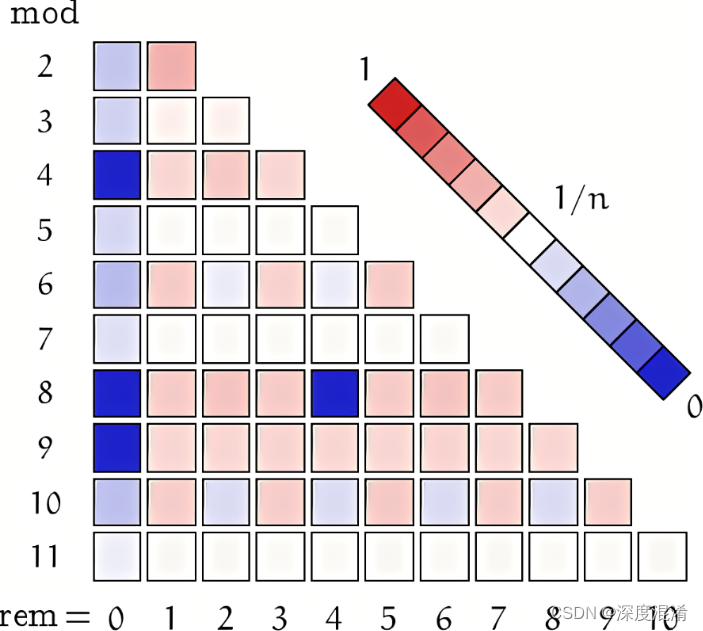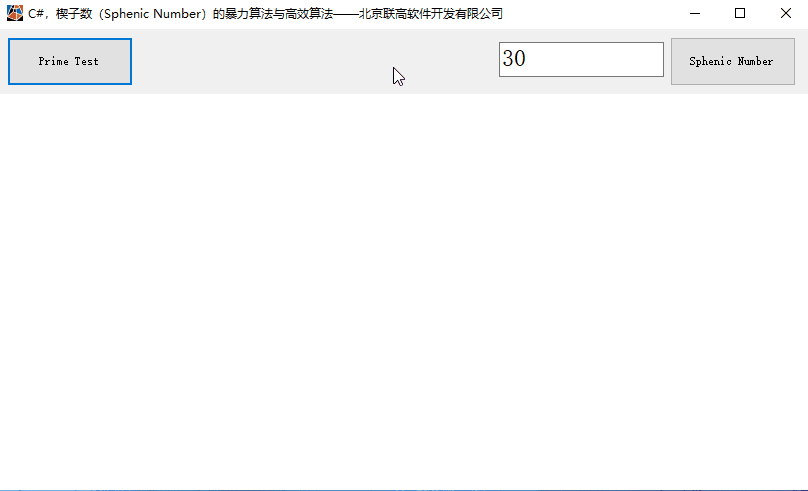C#,楔子数(Sphenic Number)的暴力算法与高效算法源代码
发布时间:2024年01月12日

楔子数(Sphenic Number)来自于一个题目:
Schoolboy Vasya is interested in the problem of distinguishing prime numbers. He has decided to develop his own testing method for it. Unfortunately, the new algorithm has one deficiency – it yields false positive outputs in case with so-called sphenic numbers. For those who does not know: sphenic number is the product of exactly three distinct prime numbers. Help Vasya write a program to distinguish sphenic numbers.
译文:
小学生瓦西亚对区分素数的问题很感兴趣。他决定开发自己的测试方法。不幸的是,新算法有一个缺陷——在使用所谓的sphenic数的情况下,它会产生假阳性输出。对于那些不知道的人来说:Sphenic Number是三个不同素数的乘积。帮助Vasya编写一个程序来计算(分解)sphenic number。
Define:
????????Sphenic Number = Prime1 * Prime2 * Prime3
Where:
????????Prime1 != Prime2
????????Prime2 != Prime3
一、运算效果

二、暴力求解算法源代码
/// <summary>
/// 最大质数
/// </summary>
private static int primeMax { get; set; } = 10467397 / 6;
/// <summary>
/// 质数总数
/// </summary>
private static int primeCount { get; set; } = 0;
/// <summary>
/// 质数筛(数组)
/// </summary>
private static int[] primeArray { get; set; } = new int[primeMax + 10];
/// <summary>
/// 构造质数(筛)
/// </summary>
public static void SieveInitialize()
{
primeCount = 0;
int[] visitArray = new int[primeMax + 10];
for (int i = 2; i < primeMax; i++)
{
if (visitArray[i] == 0)
{
primeArray[primeCount++] = i;
for (int j = 1; j * i <= primeMax; j++)
{
visitArray[j * i] = 1;
}
}
}
}
/// <summary>
/// 暴力求解 x 是不是 楔子数
/// </summary>
/// <param name="x"></param>
/// <returns></returns>
public static bool IsSphenicOriginal(int x)
{
int i = 0;
int count = 0;
for (i = 0; i < primeCount && x > 1; i++)
{
if ((x % primeArray[i]) == 0)
{
count++;
x /= primeArray[i];
}
if ((x % primeArray[i]) == 0)
{
break;
}
}
if (count == 3 && x == 1) // && !(i < cur && n > 1)
{
return true;
}
return false;
}三、高效算法
/// <summary>
/// 哈希表
/// </summary>
private Hashtable sphenicHash { get; set; } = new Hashtable();
/// <summary>
/// 保存全部楔子数的列表
/// </summary>
private List<int> sphenicNumbers { get; set; } = new List<int>();
/// <summary>
/// 表达式
/// </summary>
private List<string> sphenicExpressions { get; set; } = new List<string>();
/// <summary>
/// 构造函数
/// </summary>
/// <param name="max"></param>
public SphenicNumber(int max = 100)
{
List<int> ps = PrimeList(max);
for (int i = 0; i < ps.Count - 2; i++)
{
for (int j = i + 1; j < ps.Count - 1; j++)
{
for (int k = j + 1; k < ps.Count; k++)
{
int v = ps[i] * ps[j] * ps[k];
sphenicNumbers.Add(v);
sphenicExpressions.Add(ps[i] + "*" + ps[j] + "*" + ps[k]);
if (!sphenicHash.ContainsKey(v))
{
sphenicHash.Add(v, sphenicHash.Count);
}
}
}
}
}
/// <summary>
/// 总数
/// </summary>
public int Count
{
get
{
return sphenicNumbers.Count;
}
}
/// <summary>
/// 提取第 index 个楔子数
/// </summary>
/// <param name="index"></param>
/// <returns></returns>
public int this[int index]
{
get
{
return sphenicNumbers[index];
}
}
/// <summary>
/// 提取全部楔子数
/// </summary>
/// <returns></returns>
public List<int> ToList()
{
return (sphenicNumbers);
}
/// <summary>
/// 提取全部表达式列表
/// </summary>
/// <returns></returns>
public List<string> ToExpressionList()
{
return (sphenicExpressions);
}
/// <summary>
/// 构造不超过 x 的全部质数列表
/// </summary>
/// <param name="x"></param>
/// <returns></returns>
private List<int> PrimeList(int x = 100)
{
List<int> list = new List<int>();
list.Add(2);
list.Add(3);
for (int j = 4; j <= x; j++)
{
bool isprime = true;
for (int i = 2; (i * i) <= j; i++)
{
if ((j % i) == 0)
{
isprime = false;
break;
}
}
if (isprime)
{
list.Add(j);
}
}
return list;
}
/// <summary>
/// 检验 x 是不是楔子数?
/// </summary>
/// <param name="x"></param>
/// <returns></returns>
public bool IsSphenic(int x)
{
return sphenicHash.ContainsKey(x);
}
/// <summary>
/// 返回计算公式
/// </summary>
/// <param name="x"></param>
/// <returns></returns>
public string SphenicExpression(int x)
{
if (sphenicHash.ContainsKey(x))
{
return sphenicExpressions[(int)sphenicHash[x]];
}
return "";
}
文章来源:https://blog.csdn.net/beijinghorn/article/details/124049291
本文来自互联网用户投稿,该文观点仅代表作者本人,不代表本站立场。本站仅提供信息存储空间服务,不拥有所有权,不承担相关法律责任。 如若内容造成侵权/违法违规/事实不符,请联系我的编程经验分享网邮箱:chenni525@qq.com进行投诉反馈,一经查实,立即删除!
本文来自互联网用户投稿,该文观点仅代表作者本人,不代表本站立场。本站仅提供信息存储空间服务,不拥有所有权,不承担相关法律责任。 如若内容造成侵权/违法违规/事实不符,请联系我的编程经验分享网邮箱:chenni525@qq.com进行投诉反馈,一经查实,立即删除!
最新文章
- Python教程
- 深入理解 MySQL 中的 HAVING 关键字和聚合函数
- Qt之QChar编码(1)
- MyBatis入门基础篇
- 用Python脚本实现FFmpeg批量转换
- C高级day4
- 《吐血整理》进阶系列教程-拿捏Fiddler抓包教程(9)-Fiddler如何设置捕获Https会话
- 【Go语言】常用变量类型的创建
- 墨天轮国产数据库排行榜年终总结-2023年
- 上门按摩小程序源码解析:从零开始打造个性化定制
- Pointnet++改进注意力机制系列:全网首发SE通道注意力机制 |即插即用,实现有效涨点!
- Intel Quick Sync Video(QSV)(快速视频同步)介绍
- 智能客服系统适用行业:提升客户服务效率与满意度的解决方案
- 新版AndroidStudio dependencyResolutionManagement出错
- flutter 项目安卓开启混淆防止渗透